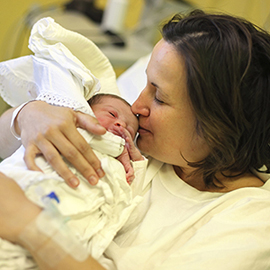Research Advances Help Provide a Foundation for a Healthy Future

Ensuring the health and wellbeing of pregnant women and newborns is central to the NICHD mission. Scientists supported by our Pregnancy and Perinatology Branch (PPB) conduct research related to improving care for pregnant women and newborns, preventing preterm labor and birth and other birth complications, and treating diseases in newborns.
Recently, we caught up with PPB Chief Tonse N. K. Raju, M.D., D.C.H., to learn how research advances by PPB-supported scientists have paved the way for healthier pregnancies and infants. We also asked him what advice he has for people interested in pursuing a career in the field, what's in store for the field going forward, and why pregnancy and perinatology research is so important. Read on to find out what he had to say.
- A huge amount of progress has been made in the last several decades to improve health and outcomes of pregnant women and newborns. Yet there is still work to be done. Why is pregnancy and perinatology research important? What are some of the PPB's major research priorities?
In spite of progress, there are many unsolved problems. For example, preterm birth and its consequences for the mother and her baby are of paramount concern. We need to understand the basic science underlying preterm labor and birth, learn how to better prevent it, and develop improved methods to treat diseases in preterm infants.
Perinatal asphyxia is another major condition of concern. This is a serious condition that, if severe, can lead to brain damage due to the baby's brain not receiving enough oxygen or blood flow. We need improved methods of predicting and treating it adequately.
We also need a better understanding of the entire field of health and diseases of pregnancy and childbirth and medical and surgical conditions affecting newborn infants.
- What advice do you have for people interested in pursuing careers in pregnancy and perinatology research?
The field is rich and exciting. The topic areas are endless—literally. One can begin with the current advances in knowledge of the human genome, imaging technologies, and other basic sciences to probe into various applications in basic science and translational research. If one is interested in clinical perinatal research, the topic is also ripe with exciting possibilities for exploration. I would encourage any interested researcher to pursue this field with gusto.
- Preterm birth can lead to a host of complications later in life, and it is important to understand its causes and ways to prevent it. What progress have researchers made in this area? What are still some important research questions to answer?
We have learned a lot about preterm labor and the role of stress, inflammation, and other maternal health conditions that lead to preterm birth. NICHD-sponsored research has led to the first successful therapy for reducing repeat preterm deliveries (in women who have a previous history of preterm birth) by the administration of 17 hydroxy-progesterone. NICHD-supported work also has helped improve outcomes for preterm infants, including development of appropriate methods of resuscitation, optimal nutritional support, and proper methods to offer assisted ventilation.
- Sudden Infant Death Syndrome (SIDS), its causes, and its prevention, are a major focus of PPB. What has PPB-supported research taught us about SIDS? What continue to be critical research areas related to SIDS?
We know that SIDS is a complex condition, not a single disease. We know, for instance, that there are developmental risk factors including the immaturity of the brainstem's breathing control systems. If these characteristics are accompanied by an unsafe sleeping environment, the risk of SIDS may increase. The major impact of NICHD work has been in disseminating the Safe to Sleep® Public Education Campaign. This is an ongoing process.

Top row, from left to right: Tonse Raju, Stephanie Archer, Maurice Davis, Rosemary Higgins, John Ilekis;
Bottom row, from left to right: Marion Koso-Thomas, Uma Reddy, Susan Tolivaisa, Marian Willinger
What do you think will be key research areas for the pregnancy and perinatology research field in the next 5 to 10 years?
Key research areas will include:- Understanding the role of the human microbiome in the health and diseases of pregnant women and of newborn infants
- Reducing long-term morbidities (e.g., pulmonary, kidney, gastrointestinal, central nervous system, and heart) of sick newborn infants
- Developing better methods to monitor pregnancy, the fetus, and placental functions
- Reducing and eliminating racial and ethnic disparities in perinatal outcomes
- Understanding what causes preterm birth and reducing occurrence
- Improving patient safety in perinatal and neonatal care
- Understanding the pharmacology of drugs for women who are pregnant and lactating
- Developing safe and effective devices and instruments for perinatal and neonatal care
- Reducing neonatal pain
- Understanding the processes leading to developmental origins of adult disorders
Another important research effort that I should highlight is the new Human Placenta Project. We've known for a long time how critical the placenta is during pregnancy. Now we're starting to learn more about how placental function in pregnancy can affect the health of women and their children years down the road. The idea behind the Human Placenta Project is to learn more about this organ—which is still not very well understood—so, ultimately, we can intervene earlier to address placental problems and help improve lifelong health.
- What message would you like the public to know about your work, or about pregnancy and perinatology research more generally?
It is only through appropriate research that we can understand the biology of health and diseases. Pregnancy is a particularly important period to study. It can be one of the most stressful times in a woman's life, and also the most important phase in the life of all human beings. A healthy beginning is a major foundation for a healthy future; by supporting research in this area, PPB works to improve the health and wellbeing of women and their children.
More Information
For more information about the Pregnancy and Perinatology Branch and its role in scientific discovery, select one of the following links:
- NICHD Resources
Originally Posted: August 11, 2014

 BACK TO TOP
BACK TO TOP